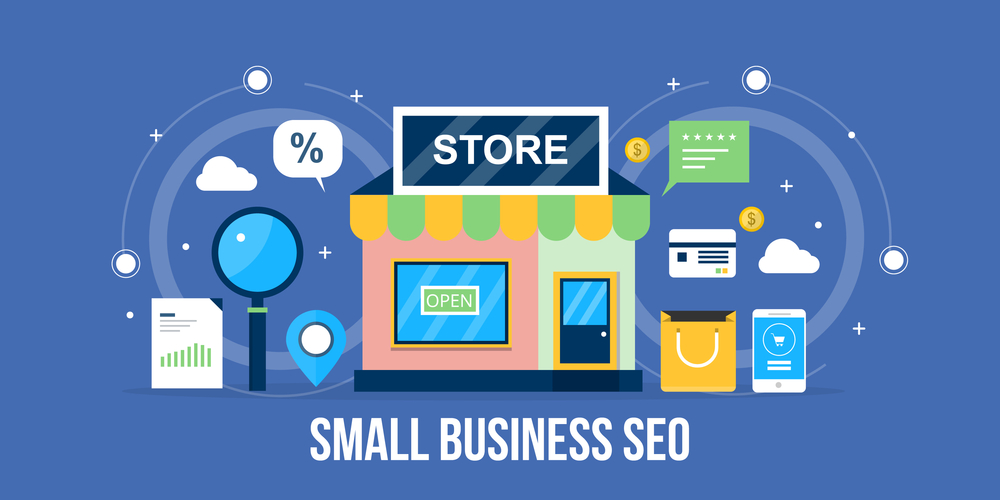Finding local customers can be difficult for small businesses, especially in today’s competitive market. But don’t worry! This guide will equip you with proven strategies to improve your local search ranking and attract more customers searching for businesses like yours.
Want to get a head start? Texas Web Design offers SEO services specifically designed to help small businesses like yours dominate local search. We’ll work with you to create a customized strategy that increases your online visibility and drives more qualified leads to your door.
Understanding the Importance of Local SEO
Local search has a significant impact on small businesses. Visibility can lead to potential customers in your area. So aiming to rank on local searches should be the goal of each business.
Step-by-Step Guide: Keyword Research & SEO Essentials
Understanding what your local customers are searching for is important to attracting them online. Keyword research helps you identify relevant search terms with local intent, allowing you to customize your content and online presence to their needs.
- Optimize Your Local Profiles
Google My Business (GMB) is a powerful tool for local businesses.
Make sure your GMB profile is complete and optimized with accurate information, including your contact details, business hours, and a compelling description that incorporates relevant keywords.
High-quality photos showcasing your work can further attract potential customers.
- Build Trust with Positive Reviews
Positive reviews not only build trust with potential clients but also improve your local search ranking.
Encourage satisfied customers to leave reviews on Google and other platforms. Responding to both positive and negative reviews demonstrates your professionalism and commitment to customer satisfaction.
- Maintain Visibility with Ongoing Efforts
Local SEO is an ongoing process. Regularly check your listings for accuracy, respond to reviews, and update your profiles with fresh content or promotions.
Consider adding blog posts or special offers that address local needs and interests. This consistent effort keeps your business relevant and increases your chances of being seen by potential customers searching online.
Keyword Mastery
Focusing on long-tail keywords that include geographical locations can further refine their relevance in local searches.
Understanding the intent behind the keywords used by potential customers can guide the creation of content that meets those needs directly.
For instance, someone searching for the “best coffee shop near me” is likely looking for options rather than detailed articles about coffee brewing techniques.
Google My Business Optimization
Claim Listing

This step is critical for controlling how the brand appears online. It makes sure that the information presented to potential customers is accurate and comprehensive.
By taking ownership of these listings, they can directly influence customer engagement. An unclaimed listing might contain outdated or incorrect information, leading to missed opportunities and frustrated customers.
So, it’s important to claim and verify these listings promptly.
Optimize Profile
To increase engagement, profiles should be fully optimized, with flexible photos, content, and descriptions that help people understand what you can do for them.
Updates and promotions should also be posted regularly. Business hours should be easily seen on your online platform as well.
On-Page SEO Techniques
Effective Strategies
Small business owners can increase their visibility in local search results by adopting innovative tactics. Hosting local events or forming partnerships with other businesses for link-building are powerful methods.
These activities not only enhance the company’s presence in the community but also improve its standing in SERPs.
They can use social media to further increase local engagement and visibility. In doing so, they reach a large audience that relies on these channels for information and recommendations.
Offering exclusive deals or content to local customers is another successful strategy. It promotes loyalty and repeat business, which is critical for long-term growth.
Mobile Optimization
Most people use their mobile phones to search for something they need. Working on making your online platform mobile-friendly should be every business owner’s goal.
Another plus factor would be a fast-loading page and easy navigation to attract more audience to browse your platforms. The chances of the audience staying on your online platform are higher if they can easily check all the details they need.
Voice Search Adaptation
With the rise of voice search, optimizing for conversational keywords and phrases has become more important.
Small business owners should structure their content in a Q&A format to directly answer common queries. This approach makes it easier for voice search algorithms to pick up and present their information to users.
Businesses that adapt quickly will reap significant benefits as more people use voice-activated devices to find information online.
Content Creation
High-Quality Local Content
Small business owners should focus on creating content that resonates with the local community. They must address local issues, events, or interests to engage their audience effectively.
This approach not only fosters a deeper connection with consumers but also enhances the relevance of their online presence in local search results.
Using local keywords in your web content can make it easier for people in your area to see you when they search for your services or products.
Creating Hyper-Local Content
Hyper-local content takes localization a step further by focusing on very specific areas or topics relevant to a community.
Small business owners can leverage this strategy by creating detailed guides, stories, or news articles about neighborhood events or issues. This type of content not only improves user experience but also positions them as go-to sources for local information.
Internal and External Links

Internal Linking Strategies
Strategic internal linking improves site navigation and effectively distributes page authority. Small business owners should use descriptive anchor text for internal links. This improves both user experience and SEO by making it clear what the linked pages are about.
They are also advised to regularly audit their website’s internal link structure. This helps identify and fix broken links, ensuring a smooth navigation experience for visitors.
Boosting External Links
For acquiring high-quality external links, tactics such as guest blogging or engaging in public relations activities can be effective. These methods not only enhance a business’s online presence but also contribute to its authority and trustworthiness.
The value of link diversity and relevance cannot be overstated when it comes to improving local search rankings. Diverse sources that are relevant to the business’s niche indicates to search engines the legitimacy and quality of the website.
However, purchasing links poses significant risks, including potential search engine penalties. Small businesses should avoid this shortcut and focus on earning links through valuable content and genuine relationships.
Reviews Management
Requesting Reviews
Small business owners understand the power of online reviews. They frequently look for ways to encourage satisfied customers to share their experiences. One excellent method is to automate review requests.
This can be done immediately after a purchase or service is complete. It guarantees that the request reaches the customer at a time when their positive experience is fresh in their mind.
Providing direct links to review platforms in emails or texts simplifies the process and encourages more customers to leave feedback. The easier it is for a customer, the more likely they are to take the time to write a review.
Responding to Reviews
Encouraging customers to leave positive or negative reviews, or responding to them, can both improve your reputation by demonstrating that you value their feedback.
Structured Data Utilization
Using digital marketing tools and platforms designed for local search engine optimization (SEO) can be quite beneficial for small business owners.
Through the integration of local SEO initiatives with more extensive digital marketing techniques, they provide a holistic approach to online exposure. Their presence is improved by this synergy across all digital touchpoints and not only in local searches.
They must not undervalue the significance of analytics. It is essential to determine how successful local SEO strategies are.
Businesses can pinpoint areas for improvement and successful tactics through data analysis. Being ahead of the competition in local marketplaces requires this constant refining process.
Implementing Schema Markup
Adding schema markup to their website is a crucial step for small businesses looking to enhance their local search visibility. Schema markup helps search engines understand the content of a website better, making it easier to display relevant information in search results.
Identify the most critical information on your website that you want to highlight in search results. This includes products, services, and customer reviews.
Use online tools like Google’s Structured Data Markup Helper to generate the correct schema markup for your content.
Add the generated schema markup to your website’s HTML code. Make sure it is placed correctly so search engines can find and interpret it accurately.
Local Platforms and Directories
Expand Your Reach: Get Listed on Local Directories
Local directories are a great way to improve your online presence and attract more local customers.
These platforms act like online phone books, helping potential customers find businesses like yours in their area. High-authority directories not only boost your visibility but also lend credibility to your business.
Focus on Quality Over Quantity
Don’t waste time submitting your business to every directory out there. Instead, focus on creating detailed profiles on the most influential platforms relevant to your specific industry.
For example, a restaurant might prioritize Yelp and OpenTable, while a contractor might focus on Houzz and Angi.
Keep Information Accurate and Up-to-Date
Once you’ve claimed your profiles, fill them with accurate and up-to-date information, including contact details, a clear description of your services, and high-quality photos that showcase your work.
Regularly monitoring and updating your listings is crucial. Any changes in business hours, services offered, or contact information should be reflected promptly across all platforms.
Auditing Business Listings
For best performance in local search, small businesses should use specialized tools for auditing their online listings.
These tools help find common issues such as inconsistent NAP (Name, Address, Phone number) information or outdated content across different directories.
Bottom Line: Dominate Your Local Market
Master local SEO, optimize your online presence, and build trust with reviews. Keep profiles fresh, embrace mobile, and create local-focused content. Get linked in and expand your reach through directories.
By following these steps and consistently refining your approach, you’ll be well on your way to attracting more local customers through search engines. Put these tips into practice today and watch your business thrive!
Contact Texas Web Design for a local SEO audit and see how we can help your business shine!
Frequently Asked Questions
What are the basics of Local SEO?
Local SEO requires focusing on attracting an audience in your area. This is made possible by making accurate listings, using the right keywords, and including geographical-specific factors.
How can I optimize my GMB profile?
Ensure your profile is complete with up-to-date information, use relevant categories, add high-quality photos, and gather customer reviews to improve visibility and credibility.
Which on-page SEO strategies are most important for small businesses?
Local keywords should be found throughout the content and other elements of your online platform. Make sure to incorporate them in your meta description, title tags, and others. Fast loading and mobile-friendly features are also a must.
Why is creating content important for winning local search results?
Creating locally relevant content helps establish your authority in your area. It attracts local customers and signals to search engines that your business is relevant to specific local searches.
How do internal and external links affect my local search ranking?
Internal links help search engines understand the structure of your site, while external links from reputable sites increase their authority. Both are crucial for improving visibility in local search results.
What role does review management play in local SEO?
It is common for people to check reviews before purchasing products or availing services. Reviews can influence the decision-making of customers so it plays an essential role in local SEO.
Why should I use structured data on my website?
Structured data helps search engines understand the content of your website better, making it easier to display rich snippets in search results. This can enhance visibility and click-through rates for local searches.
How do local platforms and directories benefit my business?
When you focus on the local market the chances of getting people’s interest is higher as the accessibility of getting to you is easier. It is wise to list your business on local directories and platforms.
Getting the right target market can lead to getting organic flow in your business.


